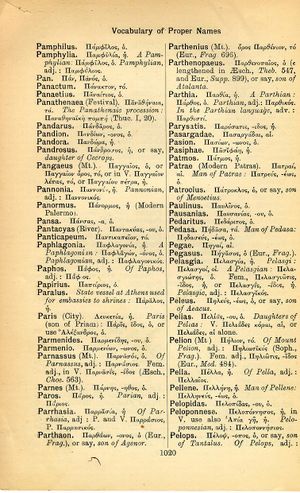Paris
ἐγώ εἰμι τὸ φῶς τοῦ κόσμου· ὁ ἀκολουθῶν μοι οὐ μὴ περιπατήσῃ ἐν τῇ σκοτίᾳ ἀλλ' ἕξει τὸ φῶς τῆς ζωῆς → I am the light of the world; he that followeth me shall not walk in darkness but shall have the light of life (John 8:12)
English > Greek (Woodhouse)
(City) Λευκετία, ἡ.
Paris (son of Priam): Πάρις, -ιδος, ὁ, or use Ἀλέξανδρος, ὁ.
Latin > English (Lewis & Short)
Păris: ĭdis, m., = Πάρις.
I The son of Priam and Hecuba, also called Alexandros. As soon as he was born, on account of an ominous dream of his mother, he was exposed on Mount Ida to perish; he was there reared by the shepherds, and there he decided the dispute between Juno, Pallas, and Venus in favor of the last, who promised him Helen, the most beautiful of women, as a reward; by carrying her off to Troy, he was the cause of the Trojan war, in which he fell by the arrow of Philoctetes: quapropter Parim pastores nunc Alexandrum vocant, Enn. ap. Varr. L. L. 7, § 82 Müll. (Trag. v. 74 Vahl.): culpatus Paris, Verg. A. 2, 602: judicium Paridis spretaeque injuria formae, id. ib. 1, 27.—Voc.: Pari, Prop. 2, 2 (3), 47.—
B Cicero sarcastically applies the name of Paris to C. Memmius, on account of his relations with the wives of Lucullus and Pompey, Cic. Att. 1, 18, 3.—
II The name of an actor, a freedman of Domitia, Suet. Dom. 3; Tac. A. 13, 21; Juv. 6, 87.—
III The name of a pantomime, Suet. Dom. 10.
Latin > French (Gaffiot 2016)
(2) Păris,¹⁰ ĭdis (acc. ĭdem, in ou im), m., Pâris ou Alexandre [fils de Priam et d’Hécube ; passa sa jeunesse au milieu des bergers du mont Ida ; choisi pour juge dans le différend qui s’était élevé entre les déesses, Minerve, Junon, Vénus au sujet de leur beauté, il adjugea la pomme d’or [le prix] à Vénus ; enleva Hélène, femme de Ménélas, roi de Sparte et provoqua ainsi la guerre de Troie] : Varro L. 7, 82

